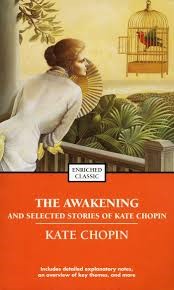
The Awakening by Kate Chopin is a novel about a woman named Edna Pontellier and the intellectual, emotional, and sexual awakening she encounters whilst vacationing in the Grand Isle with her husband Léonce and their two sons in the late 1800s. Her husband is a good man but very inattentive, so Edna strikes up a friendship in a man named Robert Lebrun. And, at first, it is just that: A friendship. But as time progresses, so do the feelings Robert and Edna share for each other. The thrill of a new romance completely “awakens” Edna. Robert leaves Grand Isle because he feels as though he can’t betray the social order of things, like courting a married woman. Edna and her family return home to New Orleans, and she paints all day while neglecting her domestic duties. She even chooses to live by herself and pursues another affair with a man named Alcée Arobin – of whom she feels no real connection. She starts hanging out exclusively with an older woman named Mademoiselle Reisz, a devoted pianist. Edna sees something in her she wishes to see in herself, a woman who has dedicated her whole life to the arts. Mademoiselle Reisz also actively encourages her romance with Robert. Robert then returns and declares his love for Edna, but he says they can’t be together. Edna tries to tell him that she’s an independent woman now and they can be together freely, but he refuses. He then asks her to marry him – and Edna panics. She doesn’t want to belong to another man. Then, a message arrives saying Edna’s friend Adèle is about to give birth, so Edna goes to be by her side. Adèle knows Edna’s true feelings for Robert, and tells her to think of her children. Edna starts to see how self-serving she has acted, and upon returning home, she notices Robert is gone. He left behind a goodbye letter. Edna, stricken with an overbearing sense of total isolation and grief, returns to Grand Isle. She realizes the gravity of her situation – she is a woman held prisoner by the time period in which she lives. She is too independent and too different from the rest of society to return. Holding steadfastly to these notions, Edna swims out to sea. She becomes consciously aware of how tired her arms and legs are getting, but nonetheless persists. She thinks of her freedom and of Robert. After some time, she inevitably drowns/commits suicide.
This book deals with a myriad of different themes, such as identity, femininity, social structure, love, marriage, and family – which are all incredibly pertinent also to the time period in which this novel was published: 1899. Edna’s small crush, which blossomed into a total love affair, kick starts her enlightened state. She thinks that she has never felt more alive. She even starts to paint again, which is something she only did when she was younger. While Edna is increasingly becoming more of her own person, she is also feeling for the first-time true pain. She feels loss when the only man she’s ever truly connected with on all planes leaves her, and fear when he wants to marry her, because she doesn’t want to be controlled. She feels selfish for the way she’s been behaving with Robert when she thinks of her children, after her friend Adèle put it into perspective. She feels liberated and free, but at what cost? Ultimately, it results in her demise, and her children must go on without a mother and her husband Léonce must deal with the aftermath of her decision. Everything she has known as fact until her awakening has proven false: that sex without love is unsatisfying, as she learns from being with Alcée Arobin, and that being a mother and wife is best thing a woman can be. This is the happiest and most liberated Edna has ever felt in her life, but she quickly realizes she is too enlightened to function in society anymore.
Personally, I really enjoyed this book until the ending. It is extremely well written, and I love Chopin’s style. I didn’t approve of Edna’s actions, of course, especially because it is noted in the novel that her husband is a good man, he is just always working and can be inattentive to Edna, and her abandonment of her children. Nonetheless, I enjoyed watching a woman in this time period grapple with societal norms and be brave enough to challenge them. This is even more extraordinary when you realize this was published in 1899 by a woman, which radicalizes the novel even further. The ending, however, is what really hurt my enjoyment of this book. I understand the message the ending sends, and in a way, I almost wouldn’t want it to end in any other way – such as marrying Robert, which would have defeated the whole point of the novel. I just can’t fathom how she let herself drown, thinking about her children. I think that is inexcusable. This is why I give the novel a 7/10. I can’t bring myself to rate it any lower because I really enjoyed this book, but Edna’s major character flaw, her selfishness, really affected it.
Check out The Awakening at the Newport Beach Public Library.
